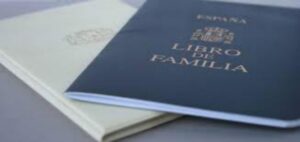The Family Book, Spanish “Libro de Familia”, is a free document issued by the Spanish Ministry of Justice and processed at the Civil Registry. It is used as a family register which records the relationship between parents and children, births, adoptions, deaths, separations, divorces and much more. In the event that the holders divorce and have children with other couples, a new book is issued to certify this new relationship.
What is the Family Book good for?
The use of the Libro de Familia was approved in 1915 during the reign of Alfonso XIII, with the aim of compressing an entire family’s data into a single document. It serves to register the family relations. The book also helps and is essential for people who are married to Spanish citizens since the document serves to proof marriage. The non-Spanish part may withdraw the NIE (Number of Foreigners Identification) with the Family Book, reside and work legally in Spain throughout the European Union. Therefore, citizens of other nationalities do also get the Libro de Familia when they are living and get married in Spain.
How to apply for the Family Book
To request a Family Book you need to go to the Civil Registry, when in Spanish territory or the Consulate of Spain, when in a foreign country.
Normally the Family Book is obtained from the Civil Registry once the marriage is celebrated or in case of unmarried couples at the time of registration of the first joint newborn child. Furthermore, the Family Book is obtained due to theft, loss or deterioration. However, the latter is now unproblematic, because with the aim of modernizing the Civil Registry, a reform of the Civil Registry Law was proposed in 2010 whereby the Family Book became digital.
Digitalization and Transformation
Digitization now means completely new challenges for the administration. With the modification of the civil registry, the citizen have a single electronic file with all his history and will be able to make any document or request through the Internet.
The digital files document each individual’s life events. The online file has a personal code linking the document to the person’s national identity card (DNI), and the data can now be viewed online with an electronic signature or in person at the registry office. Unlike the family record book, this individual file incorporates new information automatically – getting the family book updated involved a visit to the Civil Registry.
The reform has made a household document that has lasted for more than a century redundant.
Generally spoken the reform can be considered positive as it facilitates access to information and procedures. Nevertheless, it took time in some areas for the individual digital documents to be issued since some Civil Registry offices didn’t have the technology to issue the individual files. The law had been passed but not the regulation that explains the registries and how to act during the transition period.
Written in collaboration with Natalie Efiamarho




